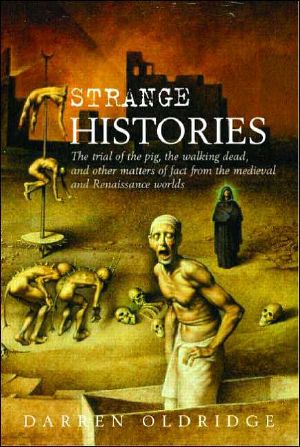Strange Histories · The Trial of the Pig, the Walking Dead, and Other Matters of Fact From the Medieval and Renaissance Worlds

- Authors
- Oldridge, Darren
- Publisher
- Routledge
- Tags
- non-fiction , european history , 21st century , v.5 , medieval history , social history , retail , amazon.com
- ISBN
- 9780415404921
- Date
- 2004-09-22T15:00:00+00:00
- Size
- 0.57 MB
- Lang
- en
Strange Histories presents a serious account of some of the most extraordinary occurrences of European and North American history and explains how they made sense to people living at the time.
From grisly anecdotes about ghosts, to stories of witches and werewolves, the book uses case studies from the Middle Ages and the early modern period and provides fascinating insights into the world-view of a vanished age. It shows how such occurences fitted in quite naturally with the "common sense" of the time and offers explanations of these riveting and ultimately rational phenomena.
What made reasonable, educated men and women behave in ways that seem utterly nonsensical to us today? This question and many more are answered in the fascinating book.
From Publishers WeeklyDespite the spooky title and cover art, this is not a collection of Gothic ghost stories or fireside tales. These accounts of pre-modern beliefs (spanning the late Middle Ages to the late 17th century) employ serious scholarship. Oldridge contends that examining the so-called "strange" beliefs of the past can help us achieve a richer understanding of history. "If we can begin to understand why a French judge warned people about demonically possessed apples in 1602," he writes, "we might start to unravel the intellectual context in which he lived." But more importantly, Oldridge hopes that grasping the context of these beliefs will encourage readers to take a critical look at their own preconceived ideas. If the book suffers from anything, it is an intellectual earnestness and over-seriousness most evident in Oldridge’s constant insistence that the majority of the people he writes about were acting with "good intentions." For example, in a chapter on the rationale behind the execution of heretics in Medieval times, Oldridge notes that "the pious desire to retrieve souls from damnation could, of course, conceal more worldly motives for suppressing dissent, but it would be unduly cynical to assume this was normally the case." In moments like this, it seems that Oldridge’s single-minded adherence to his thesis—that "bizarre" past behavior and beliefs are entirely rational when taken in context—blinds him to the instances when people may very well have had impure motivations. That said, this is still a fascinating historical study that encourages self-reflection. Copyright © Reed Business Information, a division of Reed Elsevier Inc. All rights reserved.
Review"Darren Oldridge's fascinating study of witches, angels, werewolves, heretics, persecution, and justice in the late medieval and Renaissance period is extraordinary because it is so contemporary, provocative, and insightful. By focusing on how reasonable and logical the belief systems of this historical period were, Oldridge compels readers to re-examine how we have arrogantly judged deeply held beliefs as superstitions and barbaric. Moreover, he suggests that we take a closer look at our own mores, values, and behaviors that are 'strangely' not much different from those of the late medieval and Renaissance period. His historical and cultural anthropological investigation reveals that our assumptions about the intolerance and absurd ideas of the past need to be critically re-examined if we are to deal with our own 'strange' behavior in the present." - Jack Zipes, University of Minnesota